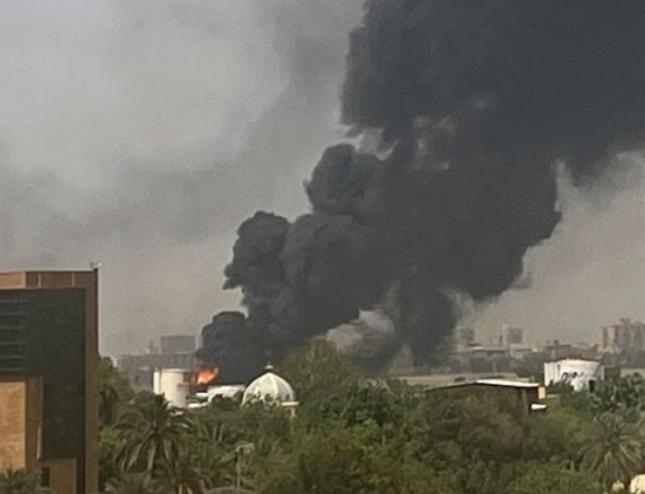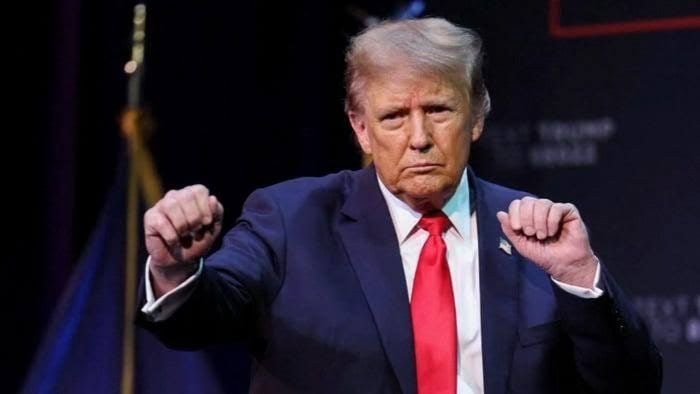Headline
Sudanese Power Struggle Erupts Into Violence

The power struggle between two generals in Sudan and its associated violence escalated dramatically on Saturday and Sunday, with at least dozens of civilians and soldiers killed.
It remains unclear who has the upper hand in the power struggle, according to media reports, which said fighting around the Sudanese army’s general command in the capital Khartoum had intensified.
At least 83 people have died and 1,126 others have been injured in heavy fighting in Sudan between the army and the influential paramilitary group Rapid Support Forces, the World Health Organisation said on Sunday.
A Sudanese medical organisation said on Sunday that so far at least 56 civilians and dozens of soldiers had been killed.
READ ALSO: US, UK Seek End To Violence In Sudan
According to WHO, the hospitals in Khartoum, which is home to around six million people, have been overwhelmed.
Among those killed on Saturday were three employees of the UN World Food Programme, which announced on Sunday that it had stopped its aid mission due to the killings.
Two other WFP employees were injured in the clashes between the army and paramilitaries.
WFP executive director Cindy McCain said the staff had been delivering relief supplies to people in the village of Kabkabiya in North Darfur.
She called for “immediate steps” to ensure the safety of other WFP staff in Sudan.
READ ALSO: Deadly Fighting Between Army, Paramilitaries In Sudan Capital
The events triggered worldwide fears of a potential civil war in the state with about 46 million inhabitants and prompted calls from the international community for an immediate ceasefire.
As the situation escalated, two important regional organisations convened emergency meetings on Sunday. The Peace and Security Council of the African Union consulted on Sunday afternoon on the “worrying” situation in Sudan. The Intergovernmental Authority on Development (IGAD) in East Africa also convened an extraordinary summit of heads of state and government.
The IGAD wants to discuss how best to “de-escalate the situation in Sudan and restore calm for the good of the country,” executive secretary Workneh Gebeyehu said on Twitter.
The clashes follow tension between Sudan’s de facto president and commander-in-chief Abdel Fattah al-Burhan and his deputy Mohammed Hamdan Daglo, also known as Hemedti, the leader of the RSF.
The RSF and the military have effectively held power in the country since the fall of dictator Omar al-Bashir in 2019.
READ ALSO: Six Journalists Detained Over Viral Video Of South Sudan President Peeing On Camera
In the course of the delayed transition to a civilian government, the RSF were to be integrated into the armed forces, which led to a rift between the allies. RSF leader Daglo accused al-Burhan of clinging to power.
Fighting broke out unexpectedly on Saturday morning in Khartoum.
The RSF claimed Sudanese soldiers had entered their headquarters in the south of the city.
RSF forces attacked the airport in the north of the city and the presidential palace.
The army used fighter planes and tanks.
READ ALSO: Just In: AU Suspends Sudan Over Military Coup
On Sunday, fighting continued to concentrate on the nearby army headquarters and the state radio building.
Both sides repeatedly reported combat successes that contradicted each other.
The claims of both sides could not be independently confirmed.
Fighting was also reported in other parts of the country such as Darfur and North Kordofan provinces.
Heavy fighting was also reported in the town of Merowe in the north of the country.
As the situation escalates, the UN Security Council called on all parties to the conflict to stop the fighting and start talks to end the crisis.
READ ALSO: Sudan’s Prime Minister, Detained After Coup, Returns Home
Humanitarian workers must also be given safe access and UN staff must be protected from attacks; the UN’s most powerful body demanded on Sunday.
The statement stressed the goal of the unity, sovereignty, independence, and territorial integrity of the republic of Sudan.
German Foreign Minister Annalena Baerbock demanded a ceasefire.
“Both sides must stop the fighting and prevent further bloodshed,” she said on Twitter, adding she was “horrified by the many victims” and that developments were being closely monitored, especially involving Germans on the ground.
U.S. Secretary of State Antony Blinken spoke with his counterparts in Saudi Arabia and the United Arab Emirates about Sudan on Saturday.
“We agreed it was essential for the parties to immediately end hostilities without pre-condition,” he said in a statement.
“I urge General Abdel Fattah al-Burhan and General Mohammed Hamdan Degalo to take active measures to reduce tensions and ensure the safety of all civilians.
“The only way forward is to return to negotiations that support the Sudanese people’s democratic aspirations,” he said.
NAN
Headline
Russia, China Afraid Of US Under My Administration — Trump

United States President, Donald Trump, has said Russia and China fear the United States because of the strength of his administration, arguing that American global influence is driven primarily by its military power and leadership.
Trump, in a post on Truth Social on Wednesday stated that rival powers would not take NATO seriously without the United States, claiming the alliance lacks deterrent force in the absence of American involvement.
He expressed doubts about whether NATO members would come to the aid of the US in a real crisis, despite Washington’s continued commitment to the alliance.
READ ALSO:Trump To Withdraw US From 66 UN, International Organisations
The president credited his leadership with rebuilding the US military during his first term and sustaining its strength, describing this as the key reason adversaries show respect and caution toward the country.
He maintained that America’s military dominance has played a central role in preserving global stability and saving lives.
Trump also argued that his administration forced NATO members to increase defence spending, saying many allies had previously failed to meet financial commitments while relying heavily on the US.
READ ALSO:Insecurity: US Congressman Riley Moore Reveals Trump’s Mission In Nigeria
He added that his actions helped prevent further escalation in Eastern Europe and contributed to the resolution of multiple conflicts.
According to Trump, the United States remains the only nation that commands genuine fear and respect from both Russia and China, a position he attributed to his administration’s approach to defence, diplomacy, and global leadership.
“He wrote partly, “The only Nation that China and Russia fear and respect is the DJT REBUILT U.S.A. MAKE AMERICA GREAT AGAIN!!! President DJT.”
Headline
Trump To Withdraw US From 66 UN, International Organisations

United States President, Donald Trump, has announced plans to withdraw the US from 66 United Nations and international organisations, including key global bodies focused on climate change, peace and democracy.
The decision was disclosed in a presidential memorandum released by the White House on Wednesday evening, following a review of which “organizations, conventions, and treaties are contrary to the interests of the United States.”
According to Trump, the move will see the US end its participation in the affected organisations and cut all related funding.
A list shared by the White House showed that 35 of the organisations are non-UN bodies, including the Intergovernmental Panel on Climate Change (IPCC), the International Institute for Democracy and Electoral Assistance, and the International Union for Conservation of Nature.
READ ALSO:Trump’s Airstrikes: Halt Military Cooperation With US Immediately – Sheikh Gumi Tells Tinubu Govt
Although listed as a non-UN body by the White House, the IPCC is a United Nations organisation that brings together leading scientists to assess climate change evidence and provide periodic reports to guide political leaders.
The memorandum also announced the US withdrawal from 31 UN entities, including the UN Framework Convention on Climate Change (UNFCCC), the UN Democracy Fund, and the UN Population Fund (UNFPA), which focuses on maternal and child health.
Several of the targeted UN bodies are involved in protecting vulnerable groups during armed conflicts, including the UN Office of the Special Representative of the Secretary-General for Children and Armed Conflict.
Reacting to the announcement, UN spokesperson Stephane Dujarric said in a note to correspondents on Wednesday evening that the organisation expected to issue a response by Thursday morning.
Despite repeatedly stating his desire to limit US involvement in UN forums, Trump has continued to exert influence on international decision-making.
READ ALSO:Trump Using FBI To ‘Intimidate’ Congress, US Lawmakers Cry Out
In October last year, he threatened to impose sanctions on diplomats who formally adopted a levy on polluting shipping fuels that had already been agreed to at an earlier meeting, a move that stalled the deal for 12 months.
The Trump administration also sanctioned UN special rapporteur Francesca Albanese after she released a report detailing the role of international and US companies in Israel’s genocidal war on Gaza.
During his first term in 2017, Trump similarly threatened to cut aid to countries that supported a draft UN resolution condemning the US decision to recognise Jerusalem as Israel’s capital.
As a permanent member of the UN Security Council, the US wields significant influence at the United Nations, including veto power, which it has repeatedly used to block efforts to end Israel’s war on Gaza before later mediating a ceasefire.
(Aljazeera)
Headline
UK Supported US Mission To Seize Russian-flagged Oil Tanker – Defense Ministry

The British Ministry of Defence said on Wednesday that it provided support to the United States in its operation to seize a Russian-flagged oil tanker in the North Atlantic.
US seized the tanker, which was being shadowed by a Russian submarine on Wednesday, after pursuing it for more than two weeks across the Atlantic as part of Washington’s efforts to block Venezuelan oil exports.
According to Britain, its armed forces gave pre-planned operational support, including basing following a US request for assistance.
READ ALSO:UK Introduces Powers To Seize Phones, SIM Cards From Illegal Migrants
The UK also said a military vessel provided support for the US forces pursuing the tanker, and the Royal Air Force provided surveillance support from the air.
Defence Secretary John Healey stated that the operation targeted a vessel with a nefarious history linked to Russian and Iranian sanctions evasion networks.
“This action formed part of global efforts to crack down on sanctions busting,” he said in a statement.
READ ALSO:Venezuelan Deportees: US Embassy Gives Reason For Reducing Visa Validity For Nigerians
According to him, the US was Britain’s closest defence and security partner.
“The depth of our defence relationship with the US is an essential part of our security, and today’s seamlessly executed operation shows just how well this works in practice,” he added.
The British government said that the Bella-1 tanker, now renamed Marinera, is sanctioned by the US under its counter-Iran sanctions,
The MoD statement said the support was provided in full compliance with international law.

 News4 days ago
News4 days agoWhat I Saw After A Lady Undressed Herself — Pastor Adeboye

 Headline4 days ago
Headline4 days agoPROPHECY: Primate Ayodele Reveals Trump’s Plot Against Tinubu

 Metro4 days ago
Metro4 days agoArmed Robbers Shot PoS Operator To Death In Edo

 Metro3 days ago
Metro3 days agoAAU Disowns Students Over Protest

 Business3 days ago
Business3 days agoNNPCL Reduces Fuel Price Again

 Metro4 days ago
Metro4 days agoJoint Task Force Kills 23 Bandits Fleeing Kano After Attacks

 Politics4 days ago
Politics4 days ago2027: Rivers APC Pledges To Follow Wike’s Instructions

 Metro3 days ago
Metro3 days agoEdo: Suspected Kidnappers Kill Victim, Hold On To Elder Brother

 Metro3 days ago
Metro3 days agoNine Soldiers Feared Dead In Borno IED Explosion

 Metro4 days ago
Metro4 days agoGunmen Demand N200m Ransom For Kidnapped Brothers In Edo






























